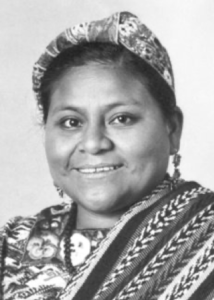
Rigoberta Menchu
Born in 1959, Rigoberta Menchú Tum is an indigenous feminist and human rights activist from Guatemala. Rigoberta has been championing the cause of Guatemala’s indigenous peoples during and after the Civil War (1960–1996) in that country. She has also been promoting indigenous rights internationally.
Even as a teenager, Rigoberta was active in the women’s rights movement in Guatemala. Her family was accused of taking part in guerrilla activities and her parents and brother were killed by the Guatemalan army. In spite of these personal tragedies, Rigoberta became an active member of the Committee of the Peasant Union (CUC), worked for better conditions for farm workers, and organized massive demonstrations in the capital. Later, she joined the radical 31st of January Popular Front and encouraged the indigenous people to resist the military oppression.
In 1981, Rigoberta had to go into hiding in Guatemala and later flee to Mexico. That marked the beginning of a new phase in her life: as the organizer abroad of resistance to oppression in Guatemala and the struggle for indigenous peoples’ rights. In 1982, she co-founded the joint opposition body, the United Representation of the Guatemalan Opposition (RUOG)
In 1983, her autobiography entitled I, Rigoberta Menchú was published. The book attracted international attention as a document of the oppression of indigenous people and the atrocities committed by the Guatemalan army in peasant villages during the civil war.
After the Guatemalan Civil War ended, Rigoberta campaigned to have some members of the Guatemalan political and military establishment tried in Spanish courts, but failed in her attempts. In 2007 and again in 2011, Rigoberta was a candidate for the Presidentship of Guatemala, but she lost on both occasions.
Over the years, Rigoberta has become widely known as a leading advocate of indigenous rights and ethno-cultural reconciliation, not only in Guatemala but in the Western Hemisphere generally. The work has earned her several international awards including the following:
- The 1992 Nobel Peace Prize for “for her struggle for social justice and ethno-cultural reconciliation based on respect for the rights of indigenous peoples.” (At that time, she was the youngest recipient of the Nobel Peace Prize and its first indigenous recipient)
- 1996 Peace Abbey Courage of Conscience Award for her authorship and advocacy for the indigenous peoples of Guatemala.
- 1998 Prince of Asturias Prize for improving the condition of women and the communities they serve. (Jointly with 6 other women)
In 1996, Rigoberta was appointed as a UNESCO Goodwill Ambassador in recognition of her activism for the rights of Indigenous people. In this capacity, she acted as a spokesperson for the first International Decade of the World’s Indigenous Peoples (1995–2004), during which she worked to improve international collaboration on issues such as environment, education, health care, and human rights for indigenous peoples.
Rigoberta continues to raise awareness for issues such as political and economic inequality and climate change. She still acts as a spokesperson for human rights, including the current violations occurring in Venezuela.
